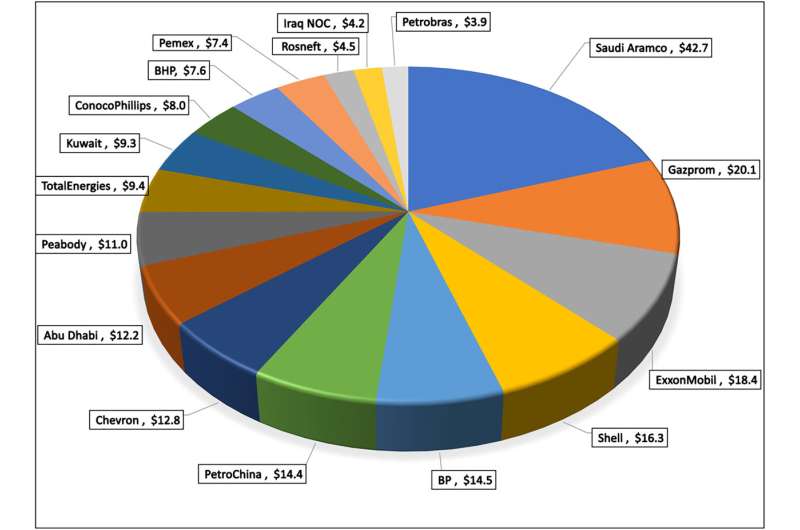Fossil fuel companies’ average annual reparations, 2025–2050 (billion US$, current)For each HR and LR company the average annual reparations for 2025–2050 is shown. Credit: One Earth (2023). DOI: 10.1016/j.oneear.2023.04.012
A pair of sociologists, one with the University of Milan-Bicocca, the other with the Climate Accountability Institute, has used survey data to calculate the amount companies should be paying in reparations to compensate for activities that have led to global warming.
In their study, reported in a Commentary piece published in the journal One Earth, Marco Grasso, and Richard Heede conducted a survey of hundreds of climate economists to learn more about the financial costs associated with global warming and who should be paying for disasters that have ensued as a result.
Prior research has found that it is possible to tie certain environmental events to climate change—the current heat wave in parts of South Asia, for example, or excessive flooding in Myanmar and Bangladesh. As it stands now, governments wind up paying to restore order in such areas, or in some cases, insurance companies pay for those who have coverage.
In some instances, no one pays and victims deal with situations by rebuilding themselves or by moving to other areas. In this new effort, the researchers suggest that because many companies—particularly those that produce and/or sell fossil fuels—are involved in ventures that result in greenhouse gas emissions, they should pay their share of disaster relief.
After averaging results, the researchers found that it was possible to assess amounts due from industry as a whole ($99 trillion for the years 2025 to 2050), certain segments of industry and even individual companies.
They found, for example, that Saudi Aramco should be paying approximately $43 billion every year and Exxon should be paying $18 billion. Such funds, the researchers point out, could be paid into a global account to fund property restoration after environmental events and perhaps to find new ways to slow or even stop greenhouse gas emissions.
The pair acknowledge that creating such a system and enforcing it would be difficult, as would managing such a system should it come to exist. But they also note that as the future unfolds and environmental disasters related to climate change become more frequent and more extreme, new sources of revenue are required to pay for them—and billing those most responsible for it, they suggest, seems the most logical approach.
More information: Marco Grasso et al, Time to pay the piper: Fossil fuel companies' reparations for climate damages, One Earth (2023). DOI: 10.1016/j.oneear.2023.04.012
Journal information: One Earth
© 2023 Science X Network























